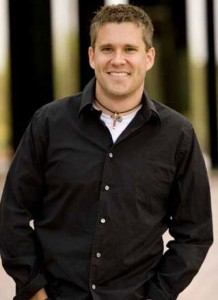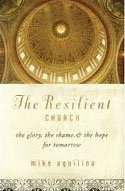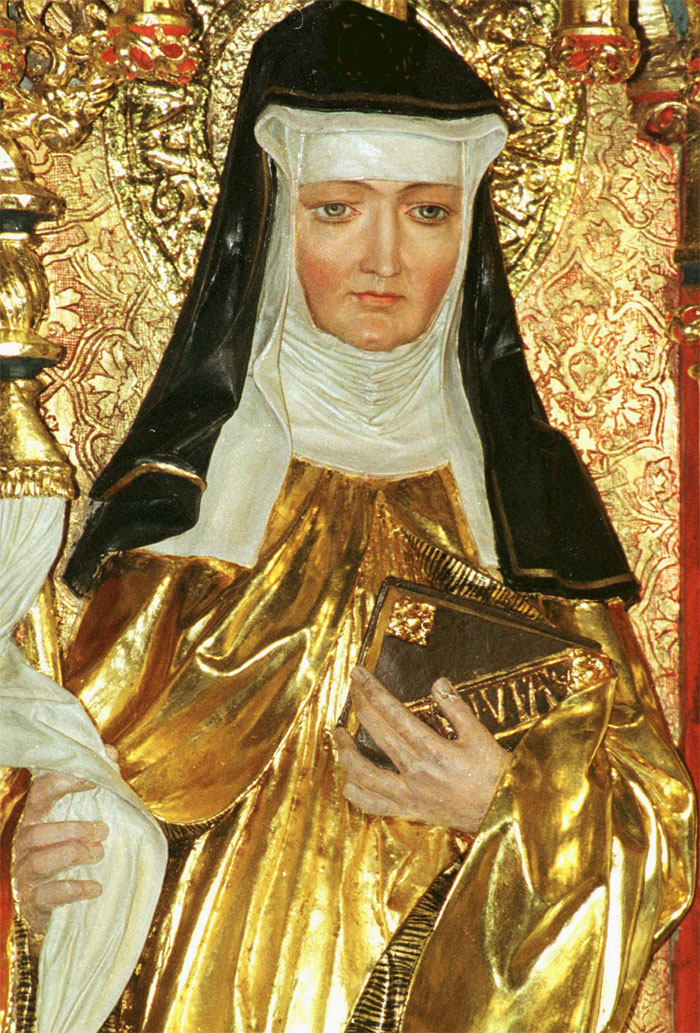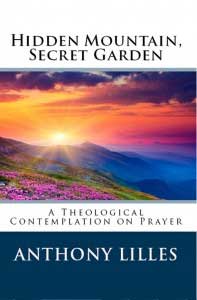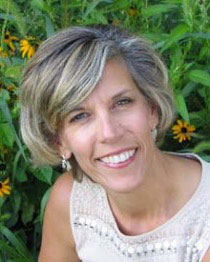The Sunday, Sunday, Sunday Podcast is a reflection on the upcoming Sunday Mass readings presented by LifeTeen.com and hosted by Mark Hart.
Sunday Readings from the USCCB
Responsorial Psalm PS 145:2-3, 8-9, 17-18
Reading 2 Â PHIL 1:20C-24, 27A
Gospel MT 20:1-16A
“The kingdom of heaven is like a landowner
who went out at dawn to hire laborers for his vineyard.
After agreeing with them for the usual daily wage,
he sent them into his vineyard.
Going out about nine o’clock,
the landowner saw others standing idle in the marketplace,
and he said to them, ‘You too go into my vineyard,
and I will give you what is just.’
So they went off.
And he went out again around noon,
and around three o’clock, and did likewise.
Going out about five o’clock,
the landowner found others standing around, and said to them,
‘Why do you stand here idle all day?’
They answered, ‘Because no one has hired us.’
He said to them, ‘You too go into my vineyard.’
When it was evening the owner of the vineyard said to his foreman,
‘Summon the laborers and give them their pay,
beginning with the last and ending with the first.’
When those who had started about five o’clock came,
each received the usual daily wage.
So when the first came, they thought that they would receive more,
but each of them also got the usual wage.
And on receiving it they grumbled against the landowner, saying,
‘These last ones worked only one hour,
and you have made them equal to us,
who bore the day’s burden and the heat.’
He said to one of them in reply,
‘My friend, I am not cheating you.
Did you not agree with me for the usual daily wage?
Take what is yours and go.
What if I wish to give this last one the same as you?
Or am I not free to do as I wish with my own money?
Are you envious because I am generous?’
Thus, the last will be first, and the first will be last.â€
Lectionary for Mass for Use in the Dioceses of the United States, second typical edition, Copyright © 2001, 1998, 1997, 1986, 1970 Confraternity of Christian Doctrine;
Tags: catholic, catholic podcast, catholic prayer, cathollc spirituality, gospel of matthew
This entry was posted on Friday, September 19th, 2014 at 5:15 am
You can follow any responses to this entry through the RSS 2.0 feed.
Temporal Consequences for Sin
[powerpress]
Common sense tells us that our sins have consequences.  If after committing a sin, we confess, then God promises to forgive us.  Yet there can still remain what the Church calls a “temporal punishment,†or consequence, for our sin.
For instance, in 2 Samuel 12 after David confesses his sin of adultery, the prophet Nathaniel tells him that the Lord has forgiven him, but nevertheless he will suffer the death of his child as a consequence of his sin.1  Our relationship with God is a personal one and our sins are not just rule violations, but personal offenses that need to be mended.
We can fulfill the temporal punishments for our sins through sincere sorrow for our sins, prayers, sacrifices, and acts of charity.

But as part of the Body of Christ, we can also assist in coming to the aid of our brothers and sisters, both living and dead.  This is the basic principle of the Church’s practice of indulgences, and undoubtedly what St. Paul has in mind in Colossians 1:24 where he says, “I rejoice in my sufferings, and complete what is lacking in Christ’s affliction for the sake of his body, the Church.â€Â  Or perhaps it’s put best in 1 Peter 4:8, which simply states, “love covers a multitude of sins.â€
1Â -Â Â 2Â Sam. 12:13-14
Tags: catholic, catholic podcast, catholic prayer, cathollc spirituality, indulgences, sin
This entry was posted on Friday, September 19th, 2014 at 3:01 am
You can follow any responses to this entry through the RSS 2.0 feed.
Episode 28- The Holy Rule of St. Benedict: A Spiritual Path for Today’s World with Fr. Mauritius Wilde O.S.B., 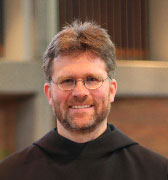 PhD.
PhD.
“The Life of St. Benedict pt 1”
We begin the reflection of the life of St. Benedict by using the biography penned by St. Gregory the Great. This episode looks at the pivotal discernment he made as a young man to pursue the religious life. Â The aspect of detachment from our earthly family, particularly our earthly fathers, in favor of our Heavenly Father, is explored by Fr. Mauritius.
[powerpress]
From the Life of Our Most Holy Father St. Benedict by St. Gregory the Great:
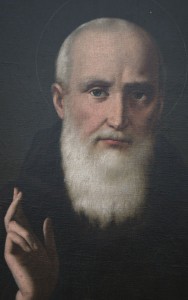
INTRODUCTION.
THERE was a man of venerable life, Benedict by name and grace, who from the time
of his very childhood carried the heart of an old man. His demeanour indeed surpassing
his age, he gave himself no disport or pleasure, but living here upon earth he despised the
world with all the glory thereof, at such time as he might have most freely enjoyed it. He
was born in the province of Nursia of honourable parentage and sent to Rome to study the
liberal sciences. But when he saw there many through the uneven paths of vice run headlong
to their own ruin, he drew back his foot, but new-set in the world, lest, in the search of human
knowledge, he might also fall into the same dangerous precipice. Contemning therefore
learning and studies and abandoning his father’s house and goods, he desired only to please
God in a virtuous life. Therefore he departed skilfully ignorant and wisely unlearned.
 For more information about the ministry of the the Missionary Benedictines of Christ the King Priory in Schuyler, Nebraska visit here:
For more information about the ministry of the the Missionary Benedictines of Christ the King Priory in Schuyler, Nebraska visit here:
Tags: catholic, catholic podcast, catholic prayer, cathollc spirituality
This entry was posted on Thursday, September 18th, 2014 at 4:13 pm
You can follow any responses to this entry through the RSS 2.0 feed.
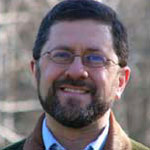 Episode 7– Reformation Inside and Out
Episode 7– Reformation Inside and Out
The Resilient Church with Mike Aquilina, offers a fascinating look at the trials and triumphs of the Catholic Church over the past two thousand years. Fast-paced sketches of critical periods in church history give readers perspective on the challenges faced by the church today. Mike Aquilina does not shrink from the realities of the past, including badly behaved leaders and those who betrayed the Lord. Yet he also leaves us all with well-founded hope for the future: God remains faithful in every circumstance and fulfills his promise to remain with his church always. Hosted by Kris McGregor
Also visit Mike’s “Discerning Hearts†page for more audio downloads and information!
Tags: catholic, catholic podcast, catholic prayer, cathollc spirituality
This entry was posted on Thursday, September 18th, 2014 at 12:32 pm
You can follow any responses to this entry through the RSS 2.0 feed.
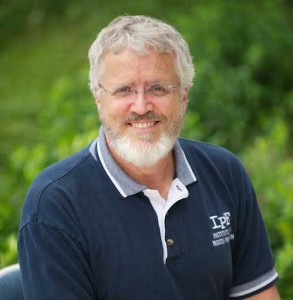 Episode 3 Salvation Begins Now: Last Things First – Â Deacon Keating continues reflecting on the reality of Purgatory. Â He discusses the teachings of the saints. Â What do our current sufferings on earth compare to purgatory? Â What does the sacrament of reconciliation offer us in this understanding?
Episode 3 Salvation Begins Now: Last Things First – Â Deacon Keating continues reflecting on the reality of Purgatory. Â He discusses the teachings of the saints. Â What do our current sufferings on earth compare to purgatory? Â What does the sacrament of reconciliation offer us in this understanding?
[powerpress]
From the Catechism of the Catholic Church:
1030 All who die in God’s grace and friendship, but still imperfectly purified, are indeed assured of their eternal salvation; but after death they undergo purification, so as to achieve the holiness necessary to enter the joy of heaven
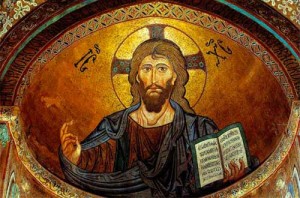
Deacon James Keating, PhD, the director of Theological Formation for the Institute for Priestly Formation, located at Creighton University, in Omaha.
For more information on the “Institute of Priestly Formation” and for other material available by Deacon Keating, just click here
Don’t forget to pickup a copy of “Communion with Christ” , it is one of the best audio sets on prayer…ever!
Check out Deacon Keating’s “Discerning Heart” page
Tags: catholic, catholic podcast, catholic prayer, cathollc spirituality, creighton university, institute for priestly formation, purgatory
This entry was posted on Wednesday, September 17th, 2014 at 9:49 am
You can follow any responses to this entry through the RSS 2.0 feed.
Dr. Matthew Bunson discusses the life, times and teachings of St. Hildegard von Bingen
Born: September 16, 1098, Bermersheim vor der Höhe, Germany
Died: September 17, 1179, Bingen am Rhein, Germany
Film music credits: Vision – From the Life of Hildegard von Bingen
From Vatican.va, an excerpt from the teachings of Pope Benedict XVIÂ
APOSTOLIC LETTER
Proclaiming Saint Hildegard of Bingen,
professed nun of the Order of Saint Benedict,
a Doctor of the Universal Church
1. A “light for her people and her timeâ€: in these words Blessed John Paul II, my Venerable Predecessor, described Saint Hildegard of Bingen in 1979, on the occasion of the eight-hundredth anniversary of the death of this German mystic. This great woman truly stands out crystal clear against the horizon of history for her holiness of life and the originality of her teaching. And, as with every authentic human and theological experience, her authority reaches far beyond the confines of a single epoch or society; despite the distance of time and culture, her thought has proven to be of lasting relevance.
In Saint Hildegard of Bingen there is a wonderful harmony between teaching and daily life. In her, the search for God’s will in the imitation of Christ was expressed in the constant practice of virtue, which she exercised with supreme generosity and which she nourished from biblical, liturgical and patristic roots in the light of the Rule of Saint Benedict. Her persevering practice of obedience, simplicity, charity and hospitality was especially visible. In her desire to belong completely to the Lord, this Benedictine Abbess was able to bring together rare human gifts, keen intelligence and an ability to penetrate heavenly realities.
2. Hildegard was born in 1098 at Bermersheim, Alzey, to parents of noble lineage who were wealthy landowners. At the age of eight she was received as an oblate at the Benedictine Abbey of Disibodenberg, where in 1115 she made her religious profession. Upon the death of Jutta of Sponheim, around the year 1136, Hildegard was called to succeed her as magistra. Infirm in physical health but vigorous in spirit, she committed herself totally to the renewal of religious life. At the basis of her spirituality was the Benedictine Rule which views spiritual balance and ascetical moderation as paths to holiness. Following the increase in vocations to the religious life, due above all to the high esteem in which Hildegard was held, around 1150 she founded a monastery on the hill of Rupertsberg, near Bingen, where she moved with twenty sisters. In 1165, she established another monastery on the opposite bank of the Rhine. She was the Abbess of both.
Within the walls of the cloister, she cared for the spiritual and material well-being of her sisters, fostering in a special way community life, culture and the liturgy. In the outside world she devoted herself actively to strengthening the Christian faith and reinforcing religious practice, opposing the heretical trends of the Cathars, promoting Church reform through her writings and preaching and contributing to the improvement of the discipline and life of clerics. At the invitation first of Hadrian IV and later of Alexander III, Hildegard practised a fruitful apostolate, something unusual for a woman at that time, making several journeys, not without hardship and difficulty, to preach even in public squares and in various cathedral churches, such as at Cologne, Trier, Liège, Mainz, Metz, Bamberg and Würzburg. The profound spirituality of her writings had a significant influence both on the faithful and on important figures of her time and brought about an incisive renewal of theology, liturgy, natural sciences and music. Stricken by illness in the summer of 1179, Hildegard died in the odour of sanctity, surrounded by her sisters at the monastery of Rupertsberg, Bingen, on 17 September 1179. (more…)
Tags: catholic, catholic podcast, catholic prayer, cathollc spirituality
This entry was posted on Wednesday, September 17th, 2014 at 9:08 am
You can follow any responses to this entry through the RSS 2.0 feed.
St. Hildegard and   “The Creation and The Fall” and the Battle of Prayer – The Mystery of Faith in the Wisdom of the Saints
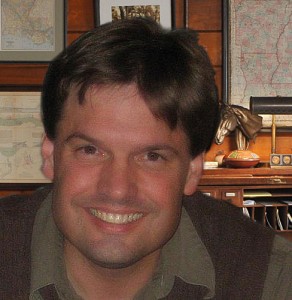
[powerpress]
Dr. Lilles’ teaches that prayer is a battle between the Truth and the lie, and how our understanding affects how we are going to live. Â We need to be aware that there is a liar who is trying to drag us down. We need to understand creation and fall, which is brought forward by a particular vision given to, doctor of the Church, St. Hildegard of Bingen. Â She helps us appreciate the “stench” of evil. Evil is the absence of something good in us, it is darkness. Â Christ is the Light which illuminates our hearts and the world.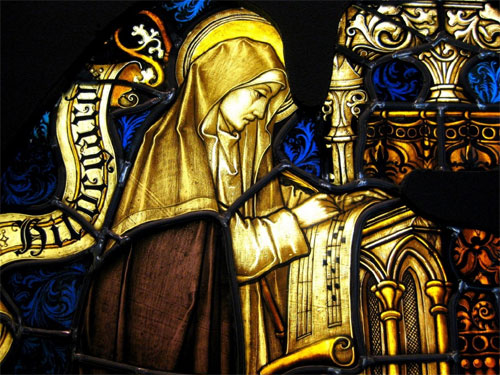
Dr.Anthony Lilles is a Catholic husband and father of three teaching Spiritual Theology at St. John Vianney Theological Seminary. He  teaches spiritual theology and spiritual direction to transitional deacons, and the spiritual classics to the men who enter the Spirituality Year, a year of prayer in preparation for seminary formation.  He is the author of the “Beginning to Pray”  Catholic blog spot.
For other episodes in the series visit the Discerning Hearts page for Dr. Anthony Lilles
Tags: Anthony Lilles, catholic, catholic podcast, catholic prayer, cathollc spirituality, Discerning Hearts, father, prayer
This entry was posted on Wednesday, September 17th, 2014 at 9:07 am
You can follow any responses to this entry through the RSS 2.0 feed.
“Making Sense of Saints: Fascinating Facts about Relics, Patrons, Saint-Making and More” by author Patricia Ann Kasten is a 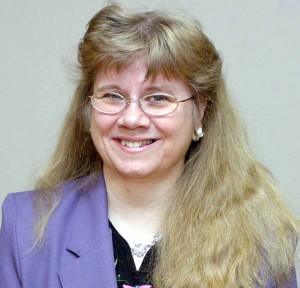 delightful book!  Not only is the canonization process fully illuminated, but Patricia has filled the book with fascinating stories and little known facts.   Everything you ever wanted to know, from the use of relics and holy cards to how miracles are determined can be found in this excellent book brought to us by publisher, Our Sunday Visitor.  A thoroughly engaging read. [powerpress]
delightful book!  Not only is the canonization process fully illuminated, but Patricia has filled the book with fascinating stories and little known facts.   Everything you ever wanted to know, from the use of relics and holy cards to how miracles are determined can be found in this excellent book brought to us by publisher, Our Sunday Visitor.  A thoroughly engaging read. [powerpress] 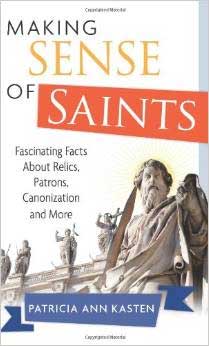 You can find the book here
You can find the book here
You’ll be fascinated and delighted by topics such as: Just Four Easy (Sort of) Steps: The Canonization Process “Doesn’t He Just Glow? Saints’ Symbols “There’s a Man Buried under the Altar!” Relics of Saints “Holy Haloes, God-Made Man!” Saints and Martyrs as Superheroes “Yo-ho-ho!” The Treasure Chest of the Church And much more!
Tags: catholic, catholic podcast, catholic prayer, cathollc spirituality
This entry was posted on Wednesday, September 17th, 2014 at 9:07 am
You can follow any responses to this entry through the RSS 2.0 feed.
Episode 5 “What am I to do?†The Discernment of God’s Will in Everyday Decisions w/Fr. Timothy  Gallagher
Gallagher
This episode offers a continuing look at the importance of the disposition of heart and the means which help us to be open to God’s will.  Then Fr. Gallagher begins the opening conversation on the vocation God may be calling us to.
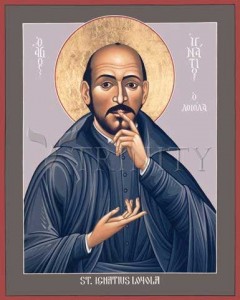
[powerpress]
For other episodes in the series visit The Discerning Hearts “Discerning the Will of God†page
Father Timothy M. Gallagher, O.M.V., was ordained in 1979 as a member of the Oblates of the Virgin Mary, a religious community dedicated to retreats and spiritual formation according to the Spiritual Exercises of St. Ignatius. Â Fr. Gallagher is featured on the EWTN series “Living the Discerning Life: Â The Spiritual Teachings of St. Ignatius of Loyola”.
For more information on how to obtain copies of Fr. Gallaghers’s various books and audio which are available for purchase, please visit  his  website:   frtimothygallagher.org
For the other episodes in this series check out Fr. Timothy Gallagher’s “Discerning Hearts†page
Tags: catholic, catholic podcast, catholic prayer, cathollc spirituality
This entry was posted on Monday, September 15th, 2014 at 11:44 am
You can follow any responses to this entry through the RSS 2.0 feed.
Episode 5 – Whether sacred doctrine is a matter of argument? [powerpress]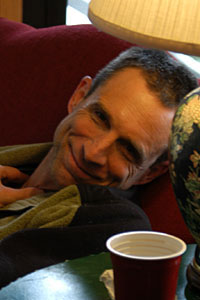
Question 1 Article 8Â Whether sacred doctrine is a matter of argument?
Objection 1: It seems this doctrine is not a matter of argument. For Ambrose says (De Fide 1): “Put arguments aside where faith is sought.” But in this doctrine, faith especially is sought: “But these things are written that you may believe” (Jn. 20:31). Therefore sacred doctrine is not a matter of argument.
Objection 2: Further, if it is a matter of argument, the argument is either from authority or from reason. If it is from authority, it seems unbefitting its dignity, for the proof from authority is the weakest form of proof. But if it is from reason, this is unbefitting its end, because, according to Gregory (Hom. 26), “faith has no merit in those things of which human reason brings its own experience.” Therefore sacred doctrine is not a matter of argument.
On the contrary, The Scripture says that a bishop should “embrace that faithful word which is according to doctrine, that he may be able to exhort in sound doctrine and to convince the gainsayers” (Titus 1:9). 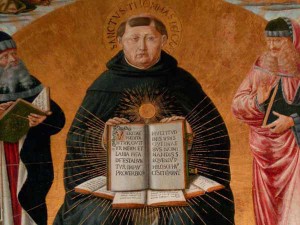
I answer that, As other sciences do not argue in proof of their principles, but argue from their principles to demonstrate other truths in these sciences: so this doctrine does not argue in proof of its principles, which are the articles of faith, but from them it goes on to prove something else; as the Apostle from the resurrection of Christ argues in proof of the general resurrection (1 Cor. 15). However, it is to be borne in mind, in regard to the philosophical sciences, that the inferior sciences neither prove their principles nor dispute with those who deny them, but leave this to a higher science; whereas the highest of them, viz. metaphysics, can dispute with one who denies its principles, if only the opponent will make some concession; but if he concede nothing, it can have no dispute with him, though it can answer his objections. Hence Sacred Scripture, since it has no science above itself, can dispute with one who denies its principles only if the opponent admits some at least of the truths obtained through divine revelation; thus we can argue with heretics from texts in Holy Writ, and against those who deny one article of faith, we can argue from another. If our opponent believes nothing of divine revelation, there is no longer any means of proving the articles of faith by reasoning, but only of answering his objections—if he has any—against faith. Since faith rests upon infallible truth, and since the contrary of a truth can never be demonstrated, it is clear that the arguments brought against faith cannot be demonstrations, but are difficulties that can be answered. (more…)
Tags: catholic, catholic podcast, catholic prayer, cathollc spirituality
This entry was posted on Monday, September 15th, 2014 at 11:18 am
You can follow any responses to this entry through the RSS 2.0 feed.
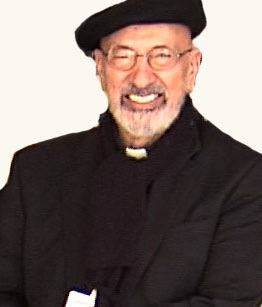 BKL 74 ” Building a Kingdom of Love” – “The Cross is the Sign of Love” Â
BKL 74 ” Building a Kingdom of Love” – “The Cross is the Sign of Love” Â
[powerpress]
Reading 2PHIL 2:6-11
Brothers and sisters:
Christ Jesus, though he was in the form of God,
did not regard equality with God something to be grasped.
Rather, he emptied himself,
taking the form of a slave,
coming in human likeness;
and found human in appearance,
he humbled himself,
becoming obedient to death,
even death on a cross.
Because of this, God greatly exalted him
and bestowed on him the name
that is above every name,
that at the name of Jesus
every knee should bend,
of those in heaven and on earth and under the earth,
and every tongue confess that
Jesus Christ is Lord,
to the glory of God the Father.
Gospel JN 3:13-17
“No one has gone up to heaven
except the one who has come down from heaven, the Son of Man.
And just as Moses lifted up the serpent in the desert,
so must the Son of Man be lifted up,
so that everyone who believes in him may have eternal life.â€
For God so loved the world that he gave his only Son,
so that everyone who believes in him might not perish
but might have eternal life.
For God did not send his Son into the world to condemn the world,
but that the world might be saved through him.
Msgr. John A. Esseff is a Roman Catholic priest in the Diocese of Scranton. He was ordained on May 30th 1953, by the late Bishop William J. Hafey, D.D. at St. Peter’s Cathedral in Scranton, PA. Msgr. Esseff served a retreat director and confessor to Blessed Mother Teresa. He continues to offer direction and retreats for the sisters of the missionaries of charity around the world. Msgr. Esseff encountered St. Padre Pio, who would become a spiritual father to him. He has lived in areas around the world, serving in the Pontifical missions, a Catholic organization established by Bl. Pope John Paul II to bring the Good News to the world especially to the poor. Msgr. Esseff assisted the founders of the Institute for Priestly Formation and continues to serve as a spiritual director for the Institute. He continues to serve as a retreat leader and director to bishops, priests and sisters and seminarians and other religious leaders around the world.   To obtain a copy of Msgr. Esseff’s book by visiting here  Be sure to visit Msgr. Esseff’s website “Building a Kingdom of Love“
 To obtain a copy of Msgr. Esseff’s book by visiting here  Be sure to visit Msgr. Esseff’s website “Building a Kingdom of Love“
Tags: catholic, catholic podcast, catholic prayer, cathollc spirituality
This entry was posted on Monday, September 15th, 2014 at 11:08 am
You can follow any responses to this entry through the RSS 2.0 feed.
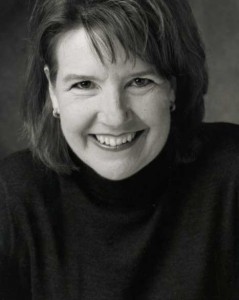 Episode 19- Seeking Truth with Sharon Doran -The Parables of Jesus (PART 1)
Episode 19- Seeking Truth with Sharon Doran -The Parables of Jesus (PART 1)
[powerpress]
Episode 19 –
The Parables of Jesus (part 1)
Through His parables, Jesus both conceals and reveals.
As Sharon teaches us in this lecture,
Jesus uses the parables to reveal the truths of the Kingdom.
Yet, he conceals his true identity as Messiah so that his plan for salvation will not be thwarted before the appointed hour of his death on the cross.
As Sharon shows us, these parables have an even deeper richness when seen through Middle Eastern eyes. Understanding the cultural details contained in parables such as the Sower or the Prodigal Son helps us to appreciate the power of these amazing stories.
Sharon’s lecture breathes new life into our understanding of these familiar stories.
Sharon Doran serves as the teaching director of “Seeking Truth.†An experienced Bible Study teacher, Sharon has a passion for scripture that will motivate and challenge you to immerse yourself in God’s Word and apply His message to your every day life.
 “Seeking Truth†is an in depth Catholic Bible Study, commissioned by the Archdiocese of Omaha in response to John Paul II’s call to the New Evangelization as well as Pope Benedict XVI’s exhortation for all Catholics to study scripture. To learn more go to:www.seekingtruth.net
“Seeking Truth†is an in depth Catholic Bible Study, commissioned by the Archdiocese of Omaha in response to John Paul II’s call to the New Evangelization as well as Pope Benedict XVI’s exhortation for all Catholics to study scripture. To learn more go to:www.seekingtruth.net
Tags: catholic, catholic podcast, catholic prayer, cathollc spirituality
This entry was posted on Monday, September 15th, 2014 at 8:48 am
You can follow any responses to this entry through the RSS 2.0 feed.
Episode 2 “What am I to do?†The Discernment of God’s Will in Everyday Decisions w/Fr. Timothy Gallagher.
This episode offers a instruction on how important it is to allow God to guide us not only in the big discernments of life, but also the decisions we make everyday.
[powerpress]
For other episodes in the series visit The Discerning Hearts “Discerning the Will of God†page
Father Timothy M. Gallagher, O.M.V., was ordained in 1979 as a member of the Oblates of the Virgin Mary, a religious community 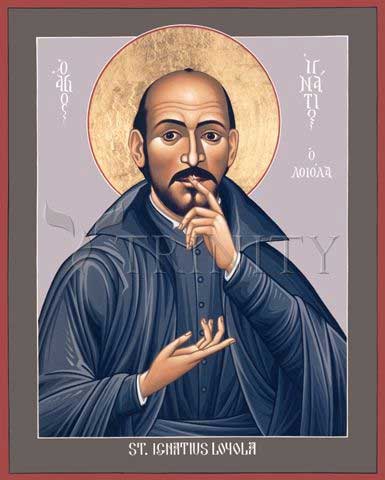 dedicated to retreats and spiritual formation according to the Spiritual Exercises of St. Ignatius. Â Fr. Gallagher is featured on the EWTN series “Living the Discerning Life: Â The Spiritual Teachings of St. Ignatius of Loyola”.
dedicated to retreats and spiritual formation according to the Spiritual Exercises of St. Ignatius. Â Fr. Gallagher is featured on the EWTN series “Living the Discerning Life: Â The Spiritual Teachings of St. Ignatius of Loyola”.
For more information on how to obtain copies of Fr. Gallaghers’s various books and audio which are available for purchase, please visit  his  website:   frtimothygallagher.org
For the other episodes in this series check out Fr. Timothy Gallagher’s “Discerning Hearts†page
Tags: catholic, catholic podcast, catholic prayer, cathollc spirituality
This entry was posted on Tuesday, September 2nd, 2014 at 11:19 am
You can follow any responses to this entry through the RSS 2.0 feed.
“Therese, Faustina and Bernadette: Three Saints Who Challenged My Faith, Gave Me Hope, and Taught Me How to Love” ties beautifully together the theological virtues (faith, hope, and love) and shows us how they are particularly lived out in the lives of three of the most beloved saints of our modern era.  Author Elizabeth Ficocelli shares her personal relationship with these beautiful saints and how they helped her to grow in her understanding and trust in Christ.  More than just a biography of each saint, this work is a road map for the spiritual life based on the lives of women who are joyfully showing us the way.
[powerpress]
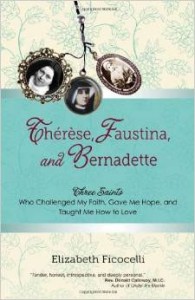 you can find the book here
you can find the book here
“With openness and candor, Elizabeth Ficocelli reveals her personal experiences of living the challenges of her Catholic faith. Her peace and joy come in meeting these challenges by embracing the cross though the grace of prayer and the sacraments, as well as following the example of newfound friends, her favorite saints. This book will help anyone who also experiences challenges in life through the assistance of some wonderful friends!”–Mother Mary Assumpta Long, Prioress General, Dominican Sisters of Mary, Mother of the Eucharist
“Tender, honest, introspective, and deeply personal, this book provides beautiful witness to the loveliness and wonder of the feminine genius! Elizabeth Ficocelli, writing from the insightful perspective of a convert to Catholicism who seeks to understand and unpack the mysteries of her own spiritual journey, reminds us in this gem of a book that we should all seek to acquire friendship with the saints and grow in the theological virtues. I highly recommend this book!”–Rev. Donald Calloway, M.I.C., Author of Under the Mantle
Tags: catholic, catholic podcast, catholic prayer, cathollc spirituality, st faustina, st. bernadette, st. therese of lieseux
This entry was posted on Tuesday, September 2nd, 2014 at 11:18 am
You can follow any responses to this entry through the RSS 2.0 feed.
Episode 4-Whether this doctrine is the same as wisdom?
[powerpress]
Question 1 Article 6 Whether this doctrine is the same as wisdom??
Objection 1: It seems that this doctrine is not the same as wisdom. For no doctrine which borrows its principles is worthy of the name of wisdom; seeing that the wise man directs, and is not directed (Metaph. i). But this doctrine borrows its principles. Therefore this science is not wisdom.
Objection 2: Further, it is a part of wisdom to prove the principles of other sciences. Hence it is called the chief of sciences, as is clear in Ethic. vi. But this doctrine does not prove the principles of other sciences. Therefore it is not the same as wisdom.
Objection 3: Further, this doctrine is acquired by study, whereas wisdom is acquired by God’s inspiration; so that it is numbered among the gifts of the Holy Spirit (Is. 11:2). Therefore this doctrine is not the same as wisdom.
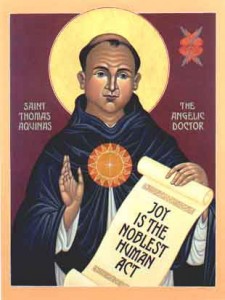 On the contrary, It is written (Dt. 4:6): “This is your wisdom and understanding in the sight of nations.”
On the contrary, It is written (Dt. 4:6): “This is your wisdom and understanding in the sight of nations.”
I answer that, This doctrine is wisdom above all human wisdom; not merely in any one order, but absolutely. For since it is the part of a wise man to arrange and to judge, and since lesser matters should be judged in the light of some higher principle, he is said to be wise in any one order who considers the highest principle in that order: thus in the order of building, he who plans the form of the house is called wise and architect, in opposition to the inferior laborers who trim the wood and make ready the stones: “As a wise architect, I have laid the foundation” (1 Cor. 3:10). Again, in the order of all human life, the prudent man is called wise, inasmuch as he directs his acts to a fitting end: “Wisdom is prudence to a man” (Prov. 10: 23). Therefore he who considers absolutely the highest cause of the whole universe, namely God, is most of all called wise. Hence wisdom is said to be the knowledge of divine things, as Augustine says (De Trin. xii, 14). But sacred doctrine essentially treats of God viewed as the highest cause—not only so far as He can be known through creatures just as philosophers knew Him—“That which is known of God is manifest in them” (Rm. 1:19)—but also as far as He is known to Himself alone and revealed to others. Hence sacred doctrine is especially called wisdom.
Reply to Objection 1: Sacred doctrine derives its principles not from any human knowledge, but from the divine knowledge, through which, as through the highest wisdom, all our knowledge is set in order.
Reply to Objection 2: The principles of other sciences either are evident and cannot be proved, or are proved by natural reason through some other science. But the knowledge proper to this science comes through revelation and not through natural reason. Therefore it has no concern to prove the principles of other sciences, but only to judge of them. Whatsoever is found in other sciences contrary to any truth of this science must be condemned as false: “Destroying counsels and every height that exalteth itself against the knowledge of God” (2 Cor. 10:4,5).
Reply to Objection 3: Since judgment appertains to wisdom, the twofold manner of judging produces a twofold wisdom. A man may judge in one way by inclination, as whoever has the habit of a virtue judges rightly of what concerns that virtue by his very inclination towards it. Hence it is the virtuous man, as we read, who is the measure and rule of human acts. In another way, by knowledge, just as a man learned in moral science might be able to judge rightly about virtuous acts, though he had not the virtue. The first manner of judging divine things belongs to that wisdom which is set down among the gifts of the Holy Ghost: “The spiritual man judgeth all things” (1 Cor. 2:15). And Dionysius says (Div. Nom. ii): “Hierotheus is taught not by mere learning, but by experience of divine things.” The second manner of judging belongs to this doctrine which is acquired by study, though its principles are obtained by revelation.
For an online version of St. Thomas Aquinas’ “Summa” click here
“Christian Apologetics with Dr. R. R. Reno” explores numerous facets of faith and reason in the life of the Church and the world. Grounded on the work of giants, such as St. Thomas Aquinas, St. Bonaventure, Blessed John Newman, soon-to-be Blessed John Paul II, G. K. Chesterton, Blaise Pascal and Stephen Barr, Dr. Reno helps us to open our minds to make the journey to our hearts.
R. R. Reno is the editor at First Things: A Journal of Religion, Culture, and Public Life, and Professor of Theology, currently on leave from Creighton University. His theological work has been published in many academic journals. Essays and opinion pieces on religion, public life, contemporary culture, and current events have appeared in Commentary, and the Washington Post. In Fighting the Noonday Devil Reno suggests that putting ourselves at the disposal of what is real is what trains us for true piety. His other recent books include Genesis: Brazos Theological Commentary on the Bible and Sanctified Vision: An Introduction to Early Christian Interpretation of the Bible.
Tags: catholic, catholic podcast, catholic prayer, cathollc spirituality
This entry was posted on Tuesday, September 2nd, 2014 at 11:15 am
You can follow any responses to this entry through the RSS 2.0 feed.

